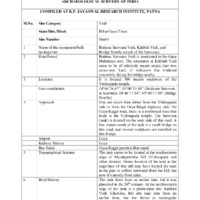-
Title
-
Documentation Sheet of Built Heritage/Site N.M.M.A., Archaeological Survey of India for Brahma Sarovar and Kak Bali
-
Subject
-
Altars, Vedic
-
Hindu architecture--India
-
Geographic coordinates (latitude, longitude)
-
24° 46' 17.94", 85° 0' 17.1"
-
Brief history
-
This tank certainly dates from an earlier time, but it was plastered in the 20th century. There is a pinda-dana site called Kakbali at the north-western edge of this tank. This site again may date from an earlier time, but the shrine here (a rectangular mandapa- pillared hall and small single chamber-temple) dates from the 20th century. This is proved by two devanagari inscriptions installed on the outer wall of the mandapa, one of which records the donation by Dalmia in the vikram samvat 2062.
-
Local tradition
-
As the name suggests, the tank is associated with Lord Brahma. Besides, Kakbali is one of pinda sites, where pilgrims performed Pinda-dana. The site doesn’t seem to be very important.
-
Location
-
500 meters south-west of the Vishnupada temple
-
Topographical features
-
The tank id located at the south-western edge of Mundapristha hill (Visnupada and other shrines). Location of the tank at the edge/base of this hill helps the tank collect all the rain-water from the hill.
-
Usage
-
Kakbali for pinda-dana and tank for rituals, bathing and other uses
-
Structure
-
The tank is plastered on all 4 sides and there are steps leading to the tank. A number of structures including open pillared halls and single chamber temples exist on the western and northern corner of the tank. On the northen edge is Kakbali.
-
Approachs
-
One can reach here either from the Visnupada side or from the Gaya-Rajgir highway side. On Gaya-Rajgir road, there is a northward road that leads to the Visnupada temple. The Sarovar (tank) is located on the west side of this road. A few meters south of the tank is a small bridge on this road, and several sculptures are installed on this bridge.
-
Airport
-
Gaya
-
Building materials
-
The structures around seem to have been built of bricks. Since the structures are painted yellow, it is difficult to see whether stones were used or not. They may have been used for constructing pillars, as is the local trend.
-
Railway station
-
Gaya
-
Bus stand
-
Gaya-Rajgir junction Bus stand
-
Conservation assessment
-
Bad
-
Ownership
-
Not clear
-
Present condition
-
Tank needs immediate cleaning and the shrines around need to be restored.
-
Omeka identifier
-
sci-site05-KPJRForm.pdf
-
Site number
-
site05
-
Abstract
-
Tank and Kakbali are sacred places but shrines here are mostly of recent origin. The bridge has an interesting collection of images. One of the Vishnu images is really good and seems to be of the eighth-ninth century and may require protection.
-
Protection status
-
Protection status Poor
 sci-site05-KPJRForm.pdf
sci-site05-KPJRForm.pdf